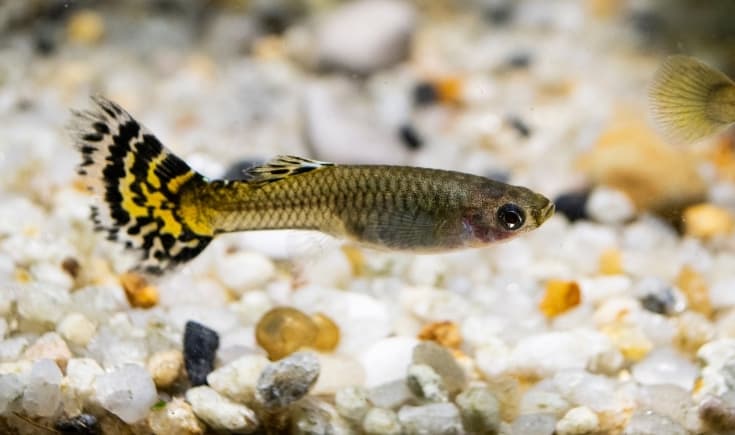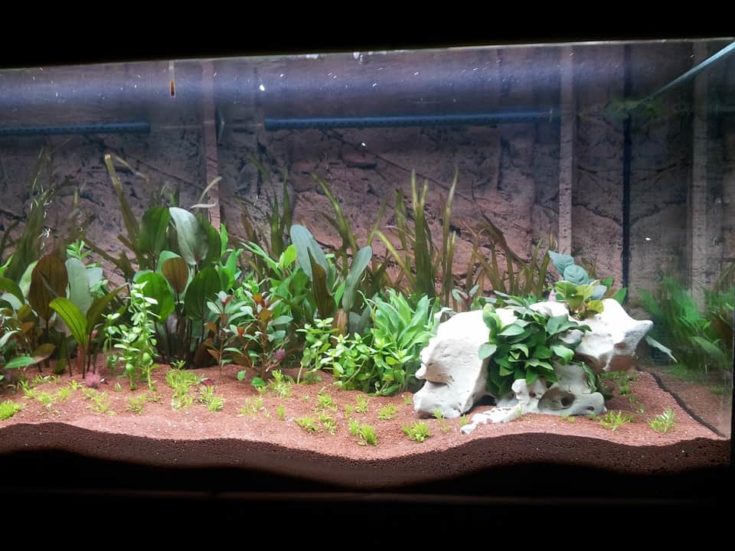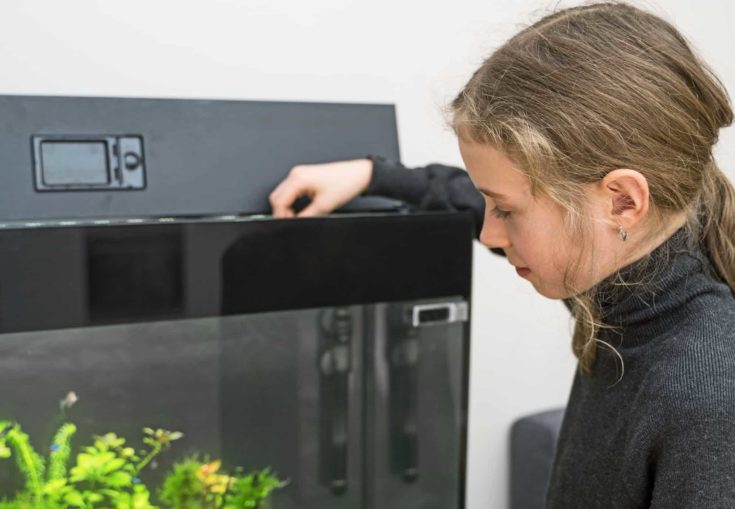Guppies are super-popular, easy-to-keep tropical aquarium fish that bring a charming blend of vibrant colors and activity to a peaceful community tank, making them ideal fish for newbies to the hobby.
Many small fish species don’t survive for very long. In fact, some are “annual” species, living for only a year or so before they die.
But how long do guppies live if given the correct care? What can you do to help your so-called “million fish” survive for the longest time? And do male guppies live longer than females?
So, the first thing to know is that guppies don’t live for long, typically surviving for between one and three years. Of course, you can extend that lifespan somewhat by providing an ideal environment and a high-quality diet.
In addition, male guppies tend to live longer than females simply because the females are constantly pregnant, and that has a considerable impact on their longevity.
Read this guide to learn everything you need to know about the guppy’s lifespan and what you can do to help your fish live longer.
How Long Do Guppies Live?

Tank-kept guppies generally live for between one and three years. However, in rare cases, some individuals can make it to five years when kept in perfect conditions!
Genetics also plays a part in guppy longevity, as does the care and diet the fish receive. Sometimes, the guppies you buy in the fish store or online might not last more than a few months in your tank. But that could simply be that the fish were already old when you bought them and had just reached the end of their natural lifespan.
What About Wild Guppies?
Male and female wild guppies generally live for around two years, the same as captive guppies.
That said, wild guppies don’t have the luxury of a safe environment, plenty of high-quality food, and optimum water conditions. In nature, guppies fall victim to predators. Extreme weather events can take their toll, and although guppies can manage without food for one to two weeks, food shortages can decimate wild populations.
Man-made problems can also affect wild guppy populations, such as pollution and habitat destruction.
Do Male Or Female Guppies Live Longest?
On average, male guppies generally live longer than females.
That’s usually because of the stress endured by female guppies during the multiple pregnancies that invariably occur when the two sexes are mixed in the aquarium.
However, if you keep only males or only females in your tank, their lifespan is around the same.
What Can Shorten A Tank-Kept Guppy’s Lifespan?
So, why do some guppies live longer than others?
There are quite a few things that can affect the lifespan of guppies. Some of those factors can be influenced by you, but some cannot.
Genetics
One big influencer of a guppy’s lifespan is the fish’s genetic makeup.
If the guppy’s parents were long-lived, the chances are that their offspring will have a long life, too. Of course, when you buy guppies from a fish store, you take potluck.
Pregnancy
Guppies are not commonly called Millions Fish for nothing!
Guppies are prolific livebearers, typically giving birth to up to 30 fry or even more in exceptional cases. Guppies are pregnant for 21 to 30 days, although the gestation period can vary. So, if you have a mix of male and female guppies in your tank, you’ll soon see dozens of tiny fry hiding among your plants!
Unfortunately, pregnancy is very stressful for female guppies, and they do tend to get pregnant an awful lot. For that reason, female guppies tend to have a shorter lifespan than males.
You can mitigate that stressful situation somewhat by ensuring that there are always more female guppies than males in your tank. That way, the females won’t be hassled quite so much. Ideally, you want a minimum of two female guppies to one male.
Also, provide the fish with plenty of dense planting and other hiding places so that the ladies can escape from the boys’ advances if they want to.
Poor Tank Conditions
Poor tank conditions are a big killer of many fish, including guppies.
If the tank is overstocked, too small, or dirty, then your guppies won’t achieve their full potential lifespan. Guppies are pretty hardy fish, but they won’t thrive or live long when kept in poor conditions.
Stress
As well as pregnancy and poor tank conditions, the wrong water parameters and unsuitable tank mates are also major stressors that can combine to shorten the guppies’ lifespan.
Stress weakens the guppies’ immune system, leaving the fish vulnerable to attack by parasites and diseases, any of which can kill them.
How Can You Increase Your Guppies’ Lifespan?
As well as reducing stress, there are several other things you can do to increase your guppies’ lifespan.
Use A Tank That’s Big Enough
As previously mentioned, overcrowding is very stressful for your fish. Even shoaling species need enough space, so you must provide your guppies with a tank that’s big enough for them.
Guppies are small fish, generally growing to around 1.5” to 2” in length. So, a 10-gallon tank is sufficient for a small group of five fish. If you want to keep more, bearing in mind that guppies are prolific breeders, you’ll need to allow an additional one gallon of water per 1” of fish.

Guppies swim in the upper to the middle area of the water column, and they love to swim in a group. So, a long rather than tall tank provides the ideal environment for these active, social little fish.
Use A Filter
Water quality and temperature have a significant influence on the longevity of guppies.
To keep the water clean, you’ll need to install a suitable filter in your tank that has mechanical and biological elements. Make sure that the filtration system you choose circulates the water around the tank at least four times every hour. To do that, look for the GPH rate on the filter packaging to make sure that it’s powerful enough for your aquarium.
You also need to vacuum the substrate once a week and carry out partial water changes to keep the aquarium clean and hygienic. For more information, read our guide to cleaning your fish tank at this link.
Water Parameters
The ideal pH for guppies is 7.0 to 7.2, and water hardness should be between 8 to 12 dGH.
Test your tank water weekly with an aquarium water test kit to ensure that the parameters are correct. Also, make sure that the water contains 0 ppm ammonia, 0 ppm nitrites, and a maximum of 20 ppm nitrates.Always treat tap water with a water conditioner to neutralize chlorine and chloramine that are highly dangerous to your fish before adding the water to your tank.
Water Temperature
The water temperature is also hugely influential on guppy lifespan. The ideal temperature range for guppies is between 72° and 82° Fahrenheit, so you’ll need to install a reliable heater in your aquarium.
Feed High-Quality Food To Your Guppies
Guppies are omnivores and will do very well on a diet of high-quality tropical fish flakes, small pellets, freeze-dried foods, frozen meaty protein, and live foods such as bloodworms, daphnia, and brine shrimp.
You can also add variety to your guppies’ diet by offering them blanched fresh veggies, including zucchini, lettuce, and cucumber.
How Often and How Much Should I Feed My Guppies?
You mustn’t overfeed your guppies. Overfeeding can lead to health problems that could shorten the lifespan of your fish.
Feed your guppies only what they will clear up in a couple of minutes. Uneaten food should be removed from the tank with a net so that it doesn’t disappear into the substrate, where it will rot and pollute your water.

I recommend that you feed your guppies twice a day, offering a different kind of food at each feeding. For example, you could give your guppies flakes in the morning and some frozen or live food in the evening.
Feeding Fry
If you have a mix of male and female guppies in your tank, you’re guaranteed to get babies in the tank regularly.
Unfortunately, those little guppies won’t enjoy a long lifespan if they get eaten by the adults, so make sure there are plenty of dense plants where the fry can take refuge. The fry will eat infusoria, or you can offer them commercially prepared fry food until they’re big enough to cope with crushed fish flakes and other adult food.
Keep Your Guppies With Peaceful Tank Mates
Guppies are highly social fish and don’t like to live alone, so you need to provide them with some company.
Like most fish, guppies will become very stressed if kept with tank mates that are large, aggressive, and might regard the guppies as a food source. Fin nippers should be avoided at all costs, as they will chase the guppies, trying to take bites out of the guppies’ flowing tails. So, keep your guppies with small, peaceful fish, and all should be well.
Ideal tank mates for guppies include:
- Platies
- Mollies
- Corydoras
- Gouramis
- Peaceful tetras
- Endler’s livebearers
- Swordtails
But the best tank mates for guppies are other guppies!
Purchase Your Guppies From A Reputable Supplier
When you buy guppies, make sure you get them from a reputable supplier that provides good quality fish.
Often, the fish stocked in pet stores are not kept in the greatest conditions and often come from fish farms where producing fish in great numbers is more important than breeding good quality stock.
The best place to buy guppies is from a specialist guppy breeder. There are around 55 varieties of guppies, so there’s plenty of choices, and specialist breeders will always use their best breeding stock to maintain the quality of the fish they produce.
Provide Hiding Places
Small fish can be timid and shy, so be sure to provide plenty of hiding places in your aquarium for your guppies. As previously mentioned, female guppies can be hassled and stressed by males, so they need places to take shelter if they want to.
In addition to rocky overhangs, caves, and pieces of driftwood, I always use plenty of lush plants in tanks containing guppies and other small fish. Many times, the female guppies want to hide from the males purely to get a break from all that courtship action!
Of course, ideally, you don’t want to have more than one male for every two or three females in the shoal to prevent the males from hassling the females too much.
I love to include floating plants in a livebearer tank. Floating plant species provide valuable hiding places for tiny fry to hang out until they’re large enough to avoid being eaten by other fish. Female guppies can take refuge among the shady leaves, too.
How To Extend Guppy Lifespan – Recap
So, you can take steps to maximize your guppies’ natural one to three-year lifespan. Here’s a quick recap of those top tips we shared with you in this guide:
- Only buy guppies from a reputable specialist breeder.
- Keep your guppies in a tank that’s big enough – at least 10 gallons for five individuals.
- If you want to keep male and female guppies, keep a minimum ratio of two females to one male. That prevents the females from becoming hassled by the males and can help to alleviate the stress caused by multiple, simultaneous pregnancies.
- Make sure that your fish tank is kept clean and well maintained.
- Use a filter that’s powerful enough for the size of the tank you have so that the water is circulated properly.
- Provide the guppies with their preferred water parameters and temperature.
- Feed the guppies a high-quality, varied, nutritious diet, and don’t overfeed them.
- Provide the guppies with peaceful tank mates.
- Make sure that the tank has plenty of lush planting and other hiding places so that the guppies feel safe and secure and females can escape the males if they need to.
All these tips ensure that your guppies don’t become stressed. Stress is one of the main factors that can influence life expectancy in guppies.
In Conclusion
I hope you enjoyed our guide to guppy life expectancy. Please feel free to share this article if you found it helpful.
The most important takeaway from what you learned here today is that chilled-out guppies tend to live longer than stressed-out ones. So, if you follow the advice and tips we gave you, your guppies should enjoy their longest life.
If you have any questions or comments, please let us have your thoughts in the comments box below.
